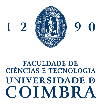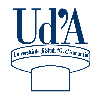EMJM-GeoPlaNet Programme
Detailed course programme
>> Download Master programme guide
>> Download GeoPlaNet-EMJM brochure


"Geology course in virtual reality: the teacher and the students communicate and interact around the 3D model of Meteor Crater (Arizona) to discuss geological processes (software developed by VR2Planets) " - Image credit: VR2Planets
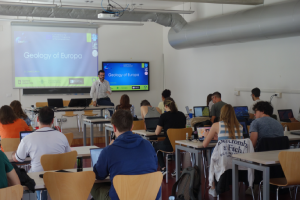
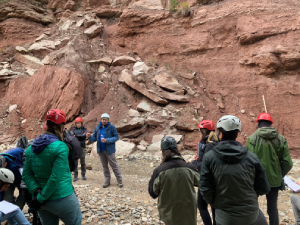
Skills
On completion of the programme, students will have achieved a wide range of soft and transversal skills and competencies which will ensure they meet the needs of the current employment market. The identified skills are as followed:
- Linguistic skills (Capacity for language learning, basic knowledge of 3 European languages)
- Communication skills and networking competences (ability to communicate effectively with different audiences at different levels, and present materials orally in a clear manner, using audio-visual aids where appropriate);
- Capacity for independent learning and maturity (soft skills)
- Knowledge and critical understanding of a number of disciplines connected to PG
- Capacity to frame and to test hypotheses; to deploy a range of research techniques and methodologies appropriate to their field of study at different scale and to define and develop creative responses to new research problems
- Skill to present materials coherently in written form, with clear use of language, professional referencing and use of tables, diagrams and graphics where appropriate;
- Capacity to work flexibly and constructively in teams, including the ability to answer questions on their work and to give and receive constructive criticism;
- IT competencies (using a range of IT resources, including cutting-edge tools such as planetary data processing and integration and VR);
- Understanding process of scientific communication and the publishing process.

Degree recognition
- Successful graduates will receive a Joint Master Degree from the 3 Partner Universities in line with national legislation, entitled: “ERASMUS MUNDUS JOINT MASTER DEGREE IN PLANETARY GEOSCIENCES – GEOPLANET". This degree is jointly accreditated in France (MASTER de Sciences, Technologies, Santé mention Sciences de la Terre et des Planètes, Environnement), in Italy (Laurea Magistrale Internazionale in Planetary Sciences) and in Portugal (Erasmus Mundus Joint Master in Planetary Geosciences).
- In addition to these degree certificates, graduates will receive a diploma supplement. This document outlines the nature of the course, curriculum and marking scheme and should help employers and universities understand the skills and achievements obtained as part of the study on the EMJM GeoPlaNet.
- To ensure transparency and the conversion of marks between institutions, the EMJM GeoPlaNet uses the European Credit Transfer System (ECTS). Upon successful completion of the course you will gain a total of 120 ECTS.
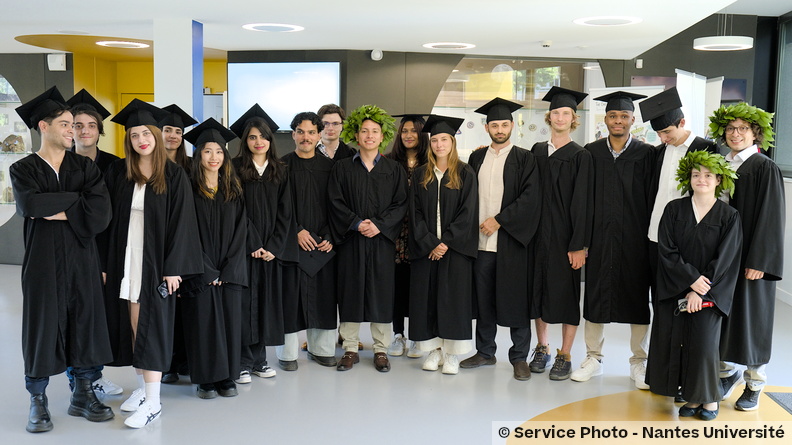
Selection and participation to the Programme
The Erasmus Programme seeks to promote equal opportunities and access, inclusion, diversity and fairness. Participants (students, staff and guest scholars) will be recruited following the principles of equal access opportunity and a specific attention will be paid from application stage to Gender Balance and individual needs and requirements.
Inclusion support during activities and mobility
All partners comply with the European applicable standards regarding disabilities and inclusion needs. The Consortium has requested the financial support to be able to support students with special needs.
Provision can be provided for participants with special needs (health issues), including those related to physical and learning disabilities (e.g., dyslexia) and to teaching and learning activities. Any student may be assessed for additional support needs and a Personal Learning and Support Plan will be developed with the student to promote full engagement and access to the EMJM activities. Inclusion support will include:
- General admin support, especially for mobility preparation (ex: finding an adapted accommodation),
- Support for learning and teaching: availability of lecture material, reinforced individual academic monitoring and support for exam /in class assessment, coursework, assignment and presentation support, library provision, additional needs associated with field trips, practical sessions and laboratory work.
- Cooperation with adequate university services to ensure students receive information (university presentation, campus, programme, courses etc.) in relevant formats and get the adequate support during their mobility periods (carer, tutoring etc.)
- IT equipment that enables participation (e.g. voice recognition, screen magnification), adaptation of furniture and rooms layout.

